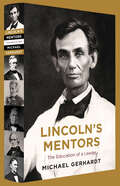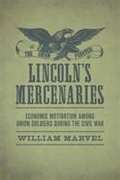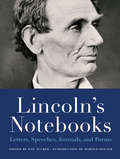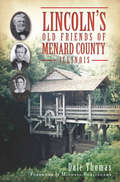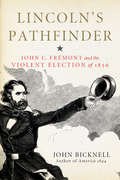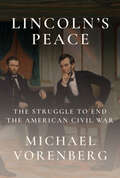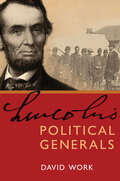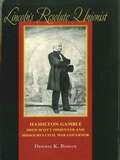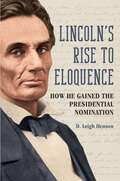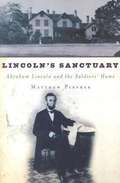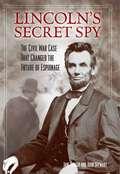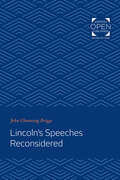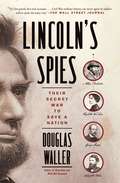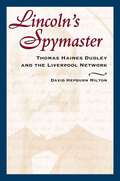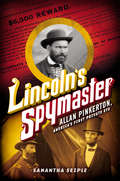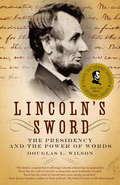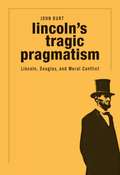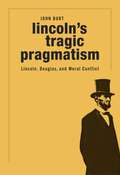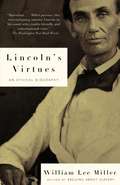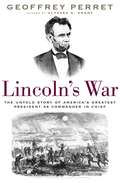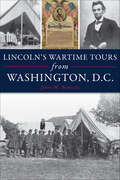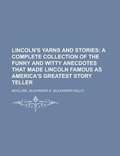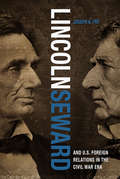- Table View
- List View
Lincoln's Mentors: The Education of a Leader
by Michael J. GerhardtA brilliant and novel examination of how Abraham Lincoln mastered the art of leadership“Abraham Lincoln had less schooling than all but a couple of other presidents, and more wisdom than every one of them. In this original, insightful book, Michael Gerhardt explains how this came to be." –H.W. Brands, Wall Street JournalIn 1849, when Abraham Lincoln returned to Springfield, Illinois, after two seemingly uninspiring years in the U.S. House of Representatives, his political career appeared all but finished. His sense of failure was so great that friends worried about his sanity. Yet within a decade, Lincoln would reenter politics, become a leader of the Republican Party, win the 1860 presidential election, and keep America together during its most perilous period. What accounted for the turnaround?As Michael J. Gerhardt reveals, Lincoln’s reemergence followed the same path he had taken before, in which he read voraciously and learned from the successes, failures, oratory, and political maneuvering of a surprisingly diverse handful of men, some of whom he had never met but others of whom he knew intimately—Henry Clay, Andrew Jackson, Zachary Taylor, John Todd Stuart, and Orville Browning. From their experiences and his own, Lincoln learned valuable lessons on leadership, mastering party politics, campaigning, conventions, understanding and using executive power, managing a cabinet, speechwriting and oratory, and—what would become his most enduring legacy—developing policies and rhetoric to match a constitutional vision that spoke to the monumental challenges of his time.Without these mentors, Abraham Lincoln would likely have remained a small-town lawyer—and without Lincoln, the United States as we know it may not have survived. This book tells the unique story of how Lincoln emerged from obscurity and learned how to lead.
Lincoln's Mercenaries: Economic Motivation Among Union Soldiers During the Civil War (Conflicting Worlds: New Dimensions of the American Civil War)
by William MarvelIn this book, the author considers whether poor northern men bore the highest burden of military service during the American Civil War. Examining data on median family wealth from the 1860 United States Census, Marvel reveals the economic conditions of the earliest volunteers from each northern state during the seven major recruitment and conscription periods of the war. The results consistently support the conclusion that the majority of these soldiers came from the poorer half of their respective states' population, especially during the first year of fighting. A fascinating, comprehensive study, the book illustrates how an array of social and economic factors drove poor northern men to rely on military wages to support themselves and their families during the war.
Lincoln's Notebooks: Letters, Speeches, Journals, and Poems (Notebook Series)
by Harold Holzer Dan TuckerThis unique collection combines the public and private words of our most beloved and eloquent American president into one essential notebook of his writings.In addition to being one of the most admired and successful politicians in history, Abraham Lincoln was a gifted writer whose speeches, eulogies, and addresses are quoted often and easily recognized all around the world. Arranged chronologically into topics such as family and friends, the law, politics and the presidency, story-telling, religion, and morality, Lincoln's Notebooks includes his famous letters to Ulysses S. Grant, Horace Greeley, and Henry Pierce as well as personal letters to Mary Todd Lincoln and his note to Mrs. Bixby, the mother who lost five sons during the Civil War. Also included are full texts of the Gettysburg Address, the Emancipation Proclamation, both of Lincoln's inaugural addresses, and his famous "A House Divided" speech. Rarely seen writings like poetry he composed as teenager give insight into Lincoln's personality and private life.Richly illustrated with seventy-five photographs, facsimiles of letters, and more, plus commentary throughout by Dan Tucker and a foreword by Lincoln expert Harold Holzer, Lincoln's Notebooks is an intimate look at this esteemed president.
Lincoln's Old Friends of Menard County, Illinois
by Dale Thomas Michael BurlingameAt the age of twenty-two, Abraham Lincoln arrived in New Salem, Illinois, as a "strange, friendless, uneducated, penniless boy" (in his own words). He did not remain friendless for long. Meet the community that welcomed him: Bennett and Elizabeth Abell, the couple who guided him through heartache; Mary Owens, Elizabeth Abell's sister who helped educate him in the realm of the heart; Mentor Graham, the schoolmaster who helped teach him; Bowling Green, the jolly justice of the peace who allowed Lincoln to practice law before his court; and Slicky Bill Greene, who clerked with Lincoln at a frontier dry goods store. Making good use of primary sources overlooked by many historians, Dale Thomas helps flesh out the important story of Lincoln's formative years in Menard County.
Lincoln's Pathfinder: John C. Fremont and the Violent Election of 1856
by John BicknellThe 1856 presidential race was the most violent peacetime election in American history. War between proslavery and antislavery settlers raged in Kansas; a congressman shot an Irish immigrant at a Washington hotel; and another congressman beat a US senator senseless on the floor of the Senate. But amid all the violence, the campaign of the new Republican Party, headed by famed explorer John C. Frémont, offered a ray of hope: a major party dedicated to limiting the spread of slavery. For the first time, women and African Americans actively engaged in a presidential contest, and the candidate's wife, Jessie Benton Frémont, played a central role in both planning and executing strategy, and was a public face of the campaign. Even enslaved blacks in the South took hope from Frémont's crusade.The 1856 campaign was also run against the backdrop of a country on the move, with settlers continuing to spread westward facing unimagined horrors, a terrible natural disaster that took hundreds of lives in the South, and one of the most famous Supreme Court cases in history, which set the stage for the Civil War. Frémont lost, but his strong showing in the North proved that a sectional party could win a national election, blazing the trail for Abraham Lincoln's victory four years later.
Lincoln's Peace: The Struggle to End the American Civil War
by Michael VorenbergOne historian&’s journey to find the end of the Civil War—and, along the way, to expand our understanding of the nature of war itself and how societies struggle to draw the line between war and peaceWe set out on the James River, March 25, 1865, aboard the paddle steamboat River Queen. President Lincoln is on his way to General Grant&’s headquarters at City Point, Virginia, and he&’s decided he won&’t return to Washington until he&’s witnessed, or perhaps even orchestrated, the end of the Civil War. Now, it turns out, more than a century and a half later, historians are still searching for that end. Was it April 9, at Appomattox, as conventional wisdom holds, where Lee surrendered to Grant in Wilmer McLean&’s parlor? Or was it ten weeks afterward, in Galveston, where a federal commander proclaimed Juneteenth the end of slavery? Or perhaps in August of 1866, when President Andrew Johnson simply declared &“the insurrection is at an end&”? That the answer was elusive was baffling even to a historian of the stature of Michael Vorenberg, whose work served as a key source of Steven Spielberg&’s Lincoln. Vorenberg was inspired to write this groundbreaking book, finding its title in the peace Lincoln hoped for but could not make before his assassination. A peace that required not one but many endings, as Vorenberg reveals in these pages, the most important of which came well more than a year after Lincoln&’s untimely death. To say how a war ends is to suggest how it should be remembered, and Vorenberg&’s search is not just for the Civil War&’s endpoint but for its true nature and legacy, so essential to the American identity. It&’s also a quest, in our age of &“forever wars,&” to understand whether the United States's interminable conflicts of the current era have a precedent in the Civil War—and whether, in a sense, wars ever end at all, or merely wax and wane.
Lincoln's Political Generals
by David WorkAt the beginning of the Civil War, President Abraham Lincoln sought to bind important political leaders to the Union by appointing them as generals. The task was formidable: he had to find enough qualified officers to command a military that would fight along a front that stretched halfway across the continent. West Point hadn't graduated enough officers, and many of its best chose to fight for the Confederacy. Lincoln needed loyal men accustomed to organization, administration, and command. He also needed soldiers, and political generals brought with them their constituents and patronage power. As the war proceeded, the value of the political generals became a matter of serious dispute. Could politicians make the shift from a political campaign to a military one? Could they be trusted to fight? Could they avoid destructive jealousies and the temptations of corruption? And with several of the generals being Irish or German immigrants, what effect would ethnic prejudices have on their success or failure? In this book, David Work examines Lincoln's policy of appointing political generals to build a national coalition to fight and win the Civil War. Work follows the careers of sixteen generals through the war to assess their contributions and to ascertain how Lincoln assessed them as commander-in-chief. Eight of the generals began the war as Republicans and eight as Democrats. Some commanded armies, some regiments. Among them were some of the most famous generals of the Union--such as Francis P. Blair Jr., John A. Dix, John A. Logan, James S. Wadsworth--and others whose importance has been obscured by more dramatic personalities. Work finds that Lincoln's policy was ultimately successful, as these generals provided effective political support and made important contributions in military administration and on the battlefield. Although several of them proved to be poor commanders, others were effective in exercising influence on military administration and recruitment, slavery policy, and national politics.
Lincoln's Political Thought
by George KatebAt the center of Lincoln's political thought and career is an intense passion for equality that runs so deep in the speeches, messages, and letters that it has the force of religious conviction for Lincoln. George Kateb examines these writings to reveal that this passion explains Lincoln's reverence for both the Constitution and the Union.
Lincoln's Resolute Unionist: Hamilton Gamble, Dred Scott Dissenter and Missouri's Civil War Governor (Southern Biography Series)
by Dennis K. BomanAs provisional governor of Missouri during the Civil War, Hamilton Gamble (1798--1864) worked closely with the Lincoln administration to keep the state from seceding from the Union. Without Gamble and other loyal Unionist governors, the war in the West might have been lost. Dennis Boman's full-scale account of Gamble's life tells the little-known story of a prominent frontier lawyer who became chief justice of the Missouri Supreme Court and boldly dissented in the infamous Dred Scott decision. Revealing how Gamble, one of the wealthiest and most renowned citizens of pre--Civil War Missouri, fought to end slavery and to protect the integrity of the Union, Lincoln's Resolute Unionist corrects prevailing notions about solidarity among the South's antebellum elite on these issues.The slaveholding border state of Missouri figured greatly in the sectional crisis from the time of its controversial admission to the Union up through the war itself, when it was the site of internecine battles between Unionists and Confederates. The complexities of the period and of the political alliances formed then emerge clearly in Boman's biography of Gamble. A fundamental conservatism -- Gamble believed judges should interpret, not make, law -- led the southern slave owner to dissent from his colleagues' proslavery decision in Scott v. Emerson. These same principles, along with Gamble's Whig affiliation and Christian convictions, made firm his antisecessionist stance despite his proslavery predilections. Boman provides a groundbreaking analysis of Lincoln's involvement in Missouri's affairs, including his assistance to Gamble in maintaining security and passing a state ordinance for gradual emancipation. Lincoln's Resolute Unionist brings to light in a compelling fashion the meaning -- and the drama -- of the life of a key figure at a critical time in American history.
Lincoln's Rise to Eloquence: How He Gained the Presidential Nomination
by D. Leigh HensonAt turns eloquent and earthy, Abraham Lincoln’s rhetoric played a vital role in his success as a politician and statesman. D. Leigh Henson examines Lincoln’s pre-presidential development as a rhetorician, the purposes and methods behind his speeches and writings, and how the works contributed to his political rise. Lincoln’s close study of the rhetorical process drew on sources that ranged from classical writings to foundational American documents to the speeches of Daniel Webster. As Henson shows, Lincoln applied his learning to combine arguments on historical, legal, and moral grounds with appeals to emotion and his own carefully curated credibility. Henson also explores Lincoln’s use of the elements of structural design to craft coherent arguments that, whatever their varying purposes, used direct and plain language to reach diverse audiences--and laid the groundwork for his rise to the White House. Insightful and revealing, Lincoln’s Rise to Eloquence follows Lincoln from his early career through the years-long clashes with Stephen A. Douglas to trace the future president’s evolution as a communicator and politician.
Lincoln's Sanctuary: Abraham Lincoln and the Soldiers' Home
by Matthew PinskerAfter the heartbreaking death of his son Willie, Abraham Lincoln and his family fled the gloom that hung over the White House, moving into a small cottage in Washington, D.C., on the grounds of the Soldiers' Home, a residence for disabled military veterans. In Lincoln's Sanctuary, historian Matthew Pinsker offers a fascinating portrait of Lincoln's stay in this cottage and tells the story of the president's remarkable growth as a national leader and a private man.
Lincoln's Secret Spy: The Civil War Case That Changed the Future of Espionage
by John Stewart Jane SingerA month after Lincoln&’s assassination, William Alvin Lloyd arrived in Washington, DC, to press a claim against the federal government for money due him for serving as the president&’s spy in the Confederacy. Lloyd claimed that Lincoln personally had issued papers of transit for him to cross into the South, a salary of $200 a month, and a secret commission as Lincoln&’s own top-secret spy. The claim convinced Secretary of War Edwin Stanton and Judge Advocate General Joseph Holt—but was it true? Before the war, Lloyd hawked his Southern Steamboat and Railroad Guide wherever he could, including the South, which would have made him a perfect operative for the Union. By 1861, though, he needed cash, so he crossed enemy lines to collect debts owed by advertising clients in Dixie. Officials arrested and jailed him, after just a few days in Memphis, for bigamy. But Lloyd later claimed it was for being a suspected Yankee spy. After bribing his way out, he crisscrossed the Confederacy, trying to collect enough money to stay alive. Between riding the rails he found time to marry plenty of unsuspecting young women only ditch them a few days later. His behavior drew the attention of Confederate detectives, who nabbed him in Savannah and charged him as a suspected spy. But after nine months, they couldn&’t find any incriminating evidence or anyone to testify against him, so they let him go. A free but broken man, Lloyd continued roaming the South, making money however he could. In May 1865, he went to Washington with an extraordinary claim and little else: a few coached witnesses, a pass to cross the lines signed &“A. Lincoln&” (the most forged signature in American history), and his own testimony. So was he really Lincoln&’s secret agent or nothing more than a notorious con man? Find out in this completely irresistible, high-spirited historical caper.
Lincoln's Speeches Reconsidered
by John Channing BriggsOriginally published in 2005. Throughout the fractious years of the mid-nineteenth century, Abraham Lincoln's speeches imparted reason and guidance to a troubled nation. Lincoln's words were never universally praised. But they resonated with fellow legislators and the public, especially when he spoke on such volatile subjects as mob rule, temperance, the Mexican War, slavery and its expansion, and the justice of a war for freedom and union.In this close examination, John Channing Briggs reveals how the process of studying, writing, and delivering speeches helped Lincoln develop the ideas with which he would so profoundly change history. Briggs follows Lincoln's thought process through a careful chronological reading of his oratory, ranging from Lincoln's 1838 speech to the Springfield Lyceum to his second inaugural address.Recalling David Herbert Donald's celebrated revisionist essays (Lincoln Reconsidered, 1947), Briggs's study provides students of Lincoln with new insight into his words, intentions, and image.
Lincoln's Spies: Their Secret War to Save a Nation
by Douglas WallerA major addition to the history of the Civil War, Lincoln’s Spies is a riveting account of the secret battles waged by Union agents to save a nation. Filled with espionage, sabotage, and intrigue, it is also a striking portrait of a shrewd president who valued what his operatives uncovered. Veteran journalist Douglas Waller, who has written ground-breaking intelligence histories, turns his sights on the shadow war of four secret agents for the North—three men and one woman. From the tense days before Abraham Lincoln’s inauguration in 1861 to the surrender at Appomattox four years later, Waller delivers a fast-paced narrative of the heroes—and scoundrels—who informed Lincoln’s generals on the enemy positions for crucial battles and busted up clandestine Rebel networks. Famed detective Allan Pinkerton mounted a successful covert operation to slip Lincoln through Baltimore before his inauguration to foil an assassination attempt. But he failed as General George McClellan’s spymaster, delivering faulty intelligence reports that overestimated Confederate strength. George Sharpe, an erudite New York lawyer, succeeded Pinkerton as spymaster for the Union’s Army of the Potomac. Recruiting skilled operatives, some of whom dressed in Rebel uniforms, Sharpe ran highly successful intelligence operations that outpaced anything the enemy could field. Elizabeth Van Lew, a Virginia heiress who hated slavery and disapproved of secession, was one of Sharpe’s most successful agents. She ran a Union spy ring in Richmond out of her mansion, with dozens of agents feeding her military and political secrets she funneled to General Ulysses S. Grant as his army closed in on the Confederate capital. Van Lew became one of the unsung heroes of the war. Lafayette Baker was a handsome Union officer with a controversial past, whose agents clashed with Pinkerton’s operatives. The unscrupulous Baker assembled a retinue of disreputable spies, thieves, and prostitutes to root out traitors in Washington, D.C. But he failed at his most important mission: uncovering the threat to Lincoln from John Wilkes Booth and his gang. Behind these secret operatives was a president, one of our greatest, who was an avid consumer of intelligence and a ruthless aficionado of clandestine warfare, willing to take chances to win the war. Lincoln’s Spies, as Waller vividly depicts in his excellent new book, set the template for the dark arts the CIA would practice in the future.
Lincoln's Springfield Neighborhood
by Richard E. Hart Bonnie E PaullWhen an emotional Abraham Lincoln took leave of his Springfield neighbors, never to return, his moving tribute to the town and its people reflected their profound influence on the newly elected president. His old neighborhood still stands today as a National Historic Site. The story of the life Lincoln and his family built there returns to us through the careful work of authors Bonnie E. Paull and Richard E. Hart. Journey back in time and meet this diverse but harmonious community as it participated in the business of everyday living while gradually playing a larger role on the national stage.
Lincoln's Spymaster (Stackpole Classics)
by David Hepburn MiltonDetails the overseas diplomatic and intelligence contest between Union and Confederate governmentsDocuments the historically neglected Thomas Haines Dudley and his European network of agentsExplores the actions that forced neutrality between England and the UnionThe American Civil War conjures images of bloody battlefields in the eastern United States. Few are aware of the equally important diplomatic and intelligence contest between the North and South in Europe. While the Confederacy eagerly sought the approval of Great Britain as a strategic ally, the Union utilized diplomacy and espionage to avert both the construction of a Confederate navy and the threat of war with England.
Lincoln's Spymaster: Allan Pinkerton, America's First Private Eye
by Samantha SeipleFrom Samantha Seiple, the award winning author of Ghosts in the Fog, comes the first book for young adults to tell the story of Allan Pinkerton, America's first private eye.Lincoln's Spymaster tells the dangerous and action-packed adventures of Allan Pinkerton, America's first private eye and Lincoln's most trusted spymaster.Pinkerton was just a poor immigrant barrel-maker in Illinois when he stumbled across his first case just miles from his home. His reputation grew and people began approaching Pinkerton with their cases, leading him to open the first-of-its-kind private detective agency. Pinkerton assembled a team of undercover agents, and together they caught train robbers, counterfeiters, and other outlaws. Soon these outlaws, including Jesse James, became their nemeses. Danger didn't stop the agency! The team even uncovered and stopped an assassination plot against president-elect Abraham Lincoln! Seeing firsthand the value of Pinkerton's service, Lincoln funded Pinkerton's spy network, a precursor to the Secret Service. Allan Pinkerton is known as the father of modern day espionage, and this is the first book for young adults to tell his story!
Lincoln's Sword
by Douglas L. WilsonWidely considered in his own time as a genial but provincial lightweight who was out of place in the presidency, Abraham Lincoln astonished his allies and confounded his adversaries by producing a series of speeches and public letters so provocative that they helped revolutionize public opinion on such critical issues as civil liberties, the use of black soldiers, and the emancipation of slaves. This is a brilliant and unprecedented examination of how Lincoln used the power of words to not only build his political career but to keep the country united during the Civil War.From the Trade Paperback edition.
Lincoln's Tragic Pragmatism
by John BurtIn 1858, challenger Abraham Lincoln debated incumbent Stephen Douglas seven times in the race for a U. S. Senate seat from Illinois. More was at stake than slavery in those debates. In Lincoln’s Tragic Pragmatism, John Burt contends that the very legitimacy of democratic governance was on the line. In a United States stubbornly divided over ethical issues, the overarching question posed by the Lincoln-Douglas debates has not lost its urgency: Can a liberal political system be used to mediate moral disputes? And if it cannot, is violence inevitable? As they campaigned against each other, both Lincoln and Douglas struggled with how to behave when an ethical conflict as profound as the one over slavery strained the commitment upon which democracy depends-namely, to rule by both consent and principle. This commitment is not easily met, because what conscience demands and what it is able to persuade others to consent to are not always the same. While Lincoln ultimately avoided a politics of morality detached from consent, and Douglas avoided a politics of expediency devoid of morality, neither found a way for liberalism to mediate the conflict of slavery. That some disputes seemed to lie beyond the horizon of deal-making and persuasion and could be settled only by violence revealed democracy’s limitations. Burt argues that the unresolvable ironies at the center of liberal politics led Lincoln to discover liberalism’s tragic dimension-and ultimately led to war. Burt’s conclusions demand reevaluations of Lincoln and Douglas, the Civil War, and democracy itself.
Lincoln's Tragic Pragmatism: Lincoln, Douglas, and Moral Conflict
by John BurtA New York Times Book Review Editors’ ChoiceIn 1858, challenger Abraham Lincoln debated incumbent Stephen Douglas seven times in the race for a U.S. Senate seat from Illinois. More was at stake than slavery in those debates. In Lincoln’s Tragic Pragmatism, John Burt contends that the very legitimacy of democratic governance was on the line. In a United States stubbornly divided over ethical issues, the overarching question posed by the Lincoln-Douglas debates has not lost its urgency: Can a liberal political system be used to mediate moral disputes? And if it cannot, is violence inevitable?“John Burt has written a work that every serious student of Lincoln will have to read...Burt refracts Lincoln through the philosophy of Kant, Rawls and contemporary liberal political theory. His is very much a Lincoln for our time.”—Steven B. Smith, New York Times Book Review“I'm making space on my overstuffed shelves for Lincoln’s Tragic Pragmatism. This is a book I expect to be picking up and thumbing through for years to come.”—Jim Cullen, History News Network“Burt treats the [Lincoln-Douglas] debates as being far more significant than an election contest between two candidates. The debates represent profound statements of political philosophy and speak to the continuing challenges the U.S. faces in resolving divisive moral conflicts.”—E. C. Sands, Choice
Lincoln's Virtues: An Ethical Biography
by William Lee MillerWilliam Lee Miller's ethical biography is a fresh, engaging telling of the story of Lincoln's rise to power. Through careful scrutiny of Lincoln's actions, speeches, and writings, and of accounts from those who knew him, Miller gives us insight into the moral development of a great politician -- one who made the choice to go into politics, and ultimately realized that vocation's fullest moral possibilities. As Lincoln's Virtues makes refreshingly clear, Lincoln was not born with his face on Mount Rushmore; he was an actual human being making choices -- moral choices -- in a real world. In an account animated by wit and humor, Miller follows this unschooled frontier politician's rise, showing that the higher he went and the greater his power, the worthier his conduct would become. He would become that rare bird, a great man who was also a good man. Uniquely revealing of its subject's heart and mind, it represents a major contribution to our understanding and of Lincoln, and to the perennial American discussion of the relationship between politics and morality.
Lincoln's War: The Untold Story of America's Greatest President as Commander-In-Chief
by Geoffrey PerretThis is a readable and yet scholarly work which serves as both history and biography. "Incredible as it may seem to us, when Lincoln became president, there was still a question as to whether the president, even acting as commander in chief, had the power to determine military policy. It fell to Lincoln to create the role of commander in chief. This book tells how he did that and how, in so doing, he created the modern presidency."
Lincoln's Wartime Tours from Washington, D.C. (Civil War Series)
by John W. SchildtAbraham Lincoln spent much of his presidency traveling. His visits to Antietam to issue the Emancipation Proclamation and to Pennsylvania for the famed Gettysburg Address are well remembered. During the course of the war, Lincoln also traveled to West Point and Harpers Ferry. As hostilities drew to a close, he spent time on the Virginia battlefields, from Petersburg to Richmond and beyond. In this new edition of Lincoln's Wartime Travels, John W. Schildt details visits to wounded soldiers both Union and Confederate, conferences with generals and the logistics of getting a wartime president from place to place.
Lincoln's Yarns and Stories
by Alexander K. McclureThis is a book that looks at some of the most famous sayings and jokes of President Abraham Lincoln. From the preface: "Sometimes it happens that the biggest crop of laugh is produced by a man who ranks among the greatest and wisest. Such a man was Abraham Lincoln whose wholesome fun mixed with true philosophy made thousands laugh and think at the same time. He was a firm believer in the saying, "Laugh and the world laughs with you." Whenever Abraham Lincoln wanted to make a strong point he usually began by saying, "Now, that reminds me of a story." And when he had told a story every one saw the point and was put into a good humor. The ancients had Aesop and his fables. The moderns had Abraham Lincoln and his stories. Aesop's Fables have been printed in book form in almost every language and millions have read them with pleasure and profit. Lincoln's stories were scattered in the recollections of thousands of people in various parts of the country. The historians who wrote histories of Lincoln's life remembered only a few of them, but the most of Lincoln's stories and the best of them remained unwritten. More than five years ago the author of this book conceived the idea of collecting all the yarns and stories, the droll sayings, and witty and humorous anecdotes of Abraham Lincoln into one large book, and this volume is the result of that idea. Before Lincoln was ever heard of as a lawyer or politician, he was famous as a story teller. As a politician, he always had a story to fit the other side; as a lawyer, he won many cases by telling the jury a story which showed them the justice of his side better than any argument could have done. While nearly all of Lincoln's stories have a humorous side, they also contain a moral, which every good story should have. They contain lessons that could be taught so well in no other way. Every one of them is a sermon. Lincoln, like the Man of Galilee, spoke to the people in parables. Nothing that can be written about Lincoln can show his character in such a true light as the yarns and stories he was so fond of telling, and at which he would laugh as heartily as anyone. For a man whose life was so full of great responsibilities, Lincoln had many hours of laughter when the humorous, fun-loving side of his great nature asserted itself."
Lincoln, Seward, and U.S. Foreign Relations in the Civil War Era (Studies in Conflict, Diplomacy, and Peace)
by Joseph A. Fry&“A heartening reminder that politicians, at their best, can rise above petty rivalries and jealousies to serve a larger cause.&” —Don H. Doyle, author of The Cause of All Nations: An International History of the American Civil War The Civil War marked a significant turning point in American history—not only for the United States itself but for its relations with foreign powers both during and after the conflict. The friendship and foreign policy partnership between President Abraham Lincoln and Secretary of State William Henry Seward shaped those US foreign policies. These unlikely allies, who began as rivals during the 1860 presidential nomination, helped ensure that America remained united and prospered in the aftermath of the nation&’s consuming war. In Lincoln, Seward, and US Foreign Relations in the Civil War Era, Joseph A. Fry examines the foreign policy decisions that resulted from this partnership and the legacy of those decisions. Lincoln and Seward, despite differences in upbringing, personality, and social status, both adamantly believed in the preservation of the union and the need to stymie slavery. They made that conviction the cornerstone of their policies abroad, and through those policies, such as Seward threatening war with any nation that intervened in the Civil War, they prevented European intervention that could have led to Northern defeat. The Union victory allowed America to resume imperial expansion, a dynamic that Seward sustained beyond Lincoln&’s death during his tenure as President Andrew Johnson&’s Secretary of State. Fry&’s analysis of the Civil War from an international perspective and the legacy of US policy decisions provides a more complete view of the war and a deeper understanding of this crucial juncture in American history.
